#and i had messaged them because i had thought all jewish people were considered poc while some were just white passing
Note
Ive seen a lot of ppl say that Musa was whitewashed by the Fate: Winx saga, but while I agree an east asian actress should have been chosen, the actress Elisha Applebaum is jewish. From what Ive read, its controversial whether jewish ppl inherently count as poc or not so im not sure if I would call it "whitewashing"
Well, I'm not sure I'm the best person to talk to about this considering I'm not Jewish?
But from what I do know, this is an extremely controversial topic (like you said) that really doesn't have any one answer. There are Jewish people who fully consider themselves to be white (and Jewish of course but like... white too), and there are Jewish people who consider themselves to be poc. I think it's important to remember that a lot of the "Jewish people aren't poc if they aren't black/asian/dark-skinned/etc" comes from antisemitism or anti-zionism. A lot of poc in the west specifically say this because of antisemitism so a lot of the arguments for it are... not great to say the least.
In regard to Elisha specifically, she's ethnically Jewish so I think you could argue that it doesn't count as whitewashing, but that's really up to Jewish people to discuss. It's obviously still wrong for her to have been cast as Musa, that's not up for discussion, but whether she considers herself white, whether Jewish people consider her white, whether non-Jewish people (goyim?) consider her white and how much of that response is linked to internal antisemitism is all very personal and case by case. I'm not sure if there's a specific term for when people sort of... race or ethnicity change a character of color to a different but still not white race so like...?
But anyway, again there is no One specific answer because there's so much discussion and outright arguing over it. A lot of Jewish people do consider themselves to be poc and often West Asian/Middle Eastern (depending on who you ask) but there are a lot of arguments among themselves as well. This discussion really should be left up to them!
It's funny you mention this because I was actually discussing this with a Jewish mutual years ago! Here are some really interesting articles (written by Jewish people (as far as I'm aware)) that I found really helpful at the time: one, two, three, and four. There were others but I can't find them now :(
(There's also the matter of people converting to Judaism which is a similar but ultimately very different conversation so I do want to clarify that I'm specifically referring to ethnically Jewish people.)
#tbh i do consider jewish people to be poc but that's also not my place to say#i didn't know elisha was jewish though! perhaps thats why they initially put her as asian in her acting bio/resume?#i remember it being like 1/4 singaporean but... idk it's been a minute since everything happened#also we still have no idea if that was even true or just like.. a rumor or something they put for what she Could pass as#anyway the reason i mentioned that mutual is because their response i think really highlights the divide in opinion#they had gotten an ask asking if jewish people counted as poc (thankfully being nice about it)#and they had responded that some are white and some are poc and they considered themselves white#and i had messaged them because i had thought all jewish people were considered poc while some were just white passing#ANYWAY the point is that this controversy affects them first and foremost so listening to jewish people is the most important thing here#but there are still differing opinions among jewish communities so as of rn youre not going to get a 'clear' answer#answered#if any actually jewish people wanna chime in thatd be really nice! no pressure obviously but i dont want to overstep yknow?#especially if anything i said was wrong! like dont worry about correcting me id love to hear it!!
2 notes
·
View notes
Text
When Adults Attack! (Teenagers)
(Sorry to everyone for dragging this up again, but some people are chronically incapable of letting drama die down.)
The last time I posted about this was 18 February. It’s now late-March. Despite repeatedly claiming to be “over it”, a self-proclaimed “respected history blogger” has been screaming into the void for over a month now. She seems to be under the unfortunate impression that she’s completely innocent of wrongdoing, all the criticism is unprovoked, she has been targeted by “white bigots”, and that she’s somehow the real victim here. So now I have to explain why that’s bullshit. Unlike her and her two friends, I don’t make extreme but vague accusations with zero evidence. I don’t make empty threats about “exposing” people.
The short story? She involved her own self in a situation that had nothing to do with her, downplayed her friends’ racism towards others, incited her followers to harass a teenager, repeatedly lied to her followers about the multiple POC who criticised her friends being “white”, and has continued to inflame the issue while trying to downplay her role in doing so. The long story? Well, I’ll let the receipts do the talking.

That’s Olivia’s first post at the start of February, days before I or anyone else had even said anything. “My anonymous Jewish friend said!” should have been a red flag to anyone capable of reading anything longer than 280 characters. I’ve already explained why Haley (lucreciadeleon/turtlemoons plus her 92849374 alt accounts) is full of shit and so have plenty of others (here, here, and here, to name a few).
Olivia claims that, as a Romani woman, she’s not obliged to engage with content that offends her. Fine. So why is a black teenager obliged to engage with Haley’s deranged anons? Why are her hate anons are so worthy of a response that not responding is an act of ANTISEMITISM that warrants Olivia telling everyone what an antisemite this teenager is for not responding? FYI, NO ONE is obligated to respond to anon hate, especially from people they’ve already blocked. And considering Haley admitted not once, not twice, but three times to breaking Tumblr’s TOS to circumvent a mutual block and send those anons (including how she did it), people are especially not obligated to engage with her.

I made my first posts exposing Taylor (lucreziaborgia/elizabethblount) and Haley’s lies and backtracking on 6 and 7 February. This was before I acknowledged Olivia’s role in inflaming the situation. In fact, I didn’t even know about her tweets until 8 February. Yet, here she is on 6 FEBRUARY already bitching about my posts to her Twitter followers. She has some nerve acting like I victimised her, just because I posted the screenshots of her bitching about me. And bragging about ‘gaslighting’? The word that multiple people have separately described what her two friends subjected them to? Classy.
I can’t “stalk” her public Twitter any more than she can “stalk” my public blog. What an exceptionally stupid claim to make, considering her tweets kept getting recommended to my mutuals whether they liked it or not. Have some integrity and own the shit you say, rather than backtracking, deleting your posts, and pretending that you didn’t say the things we saw you say. If you want to talk shit about others in public, be ready to answer for it in public.
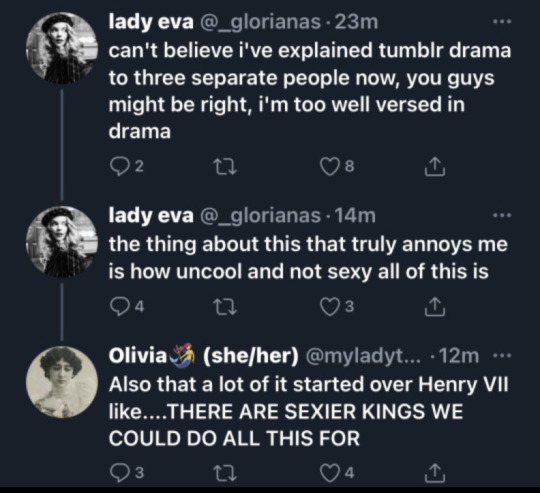
I also wonder how this started over Henry VII. I specifically wonder how this discussion between myself and May (richmond-rex) triggered Taylor’s totally unprovoked racist comments about how we and Nathen Amin “simp for a dead white man”, and we should “simp for someone who actually advocated for the rights of others” instead. The implication being that Tudor history is only for white people like Taylor, and that only her fave is worthy of discussion (“AnNe BoLeYn WaS oThErEd BeCaUsE sHe WaS tAn.” Good grief).
When multiple POC called bootleg Regina George out for it, not only did she say she couldn’t possibly be racist because Haley approved of her racism, but also tried to argue that Nathen Amin deserved it because it was inappropriate for a British man to joke about Brexit. She then claimed we called her “anti-Welsh” (another fucking lie) to make it seem like a bunch of cRaZy blacks and browns were attacking poor, innocent white her (with Olivia coming to the rescue, of course). And as if that wasn’t enough, Haley then sent these bad faith hate anons calling Nathen Amin’s tweet ANTISEMITIC, for no other reason than to retroactively justify Taylor’s racist comments (though I didn’t see Haley getting offended when she was hate-scrolling through his blog before Taylor was called out).
That was the “antisemitic shit” Haley “privately messaged about” that Olivia thinks deserves a response. In case it's not clear: defending racism makes you complicit in racism. Being Jewish is NOT a get-out-of-racism-free card, and Haley trying to use it as one is absolutely dishonest, especially when NO ONE even knew she was Jewish until she finally admitted in February she was the anonymous ‘Jewish friend’ who sent those batshit anons. Other Jewish people also called Haley out on it, yet Haley and Olivia have conveniently ignored that little fact since it contradicts their narrative.
You think it’s over? Nope. Taylor then slunk into May’s dm’s with a half-arsed apology, where she admitted that the only reason she made those racist comments about Nathen Amin was because we “attacked Gareth Russell first” (“BeCaUsE AnNe FaNs CiTe HiS wOrk”) and she “just wanted to educate us about not lionising Henry VII” (even though anyone with eyeballs can read our discussion see she’s full of shit). At the same time, she and Haley were messaging other history bloggers, telling them that everyone who called them out were antisemites (including an openly Jewish mutual of ours) in an attempt to alienate them from the community. And this was just in JANUARY.
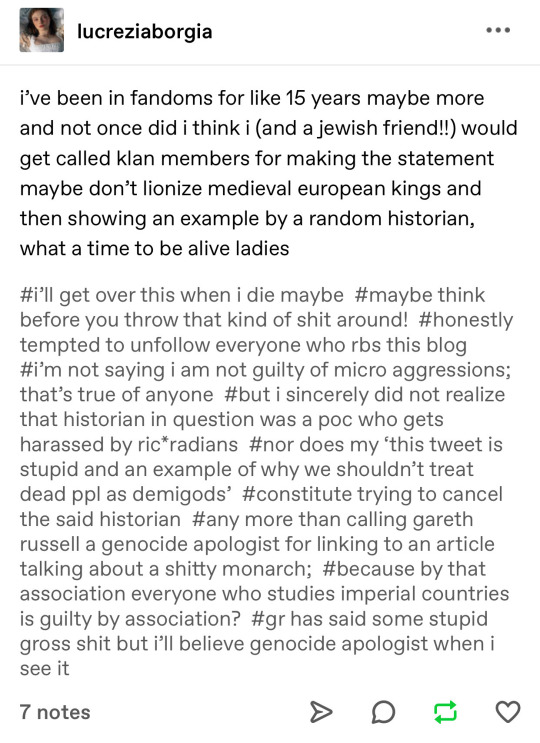
“I can’t be racist! My Jewish friend agrees with my racism!” That steaming load of backtracking horseshit is unfortunately the kind of nonsense Olivia has chosen to defend. FOR WEEKS Taylor ignored May’s messages, explaining why she — a black woman — found Taylor’s comments offensive. Did Taylor listen? Nope. In fact, she only replied in February: after she already started posting about how ignoring Haley’s hate anons was “antisemitism”. How convenient. Taylor might be a fucking idiot but we’re not. She only replied to May because she was afraid we’d use her own words against her. Clearly she never learnt a damn thing because here she is on 6 February backtracking on her apology. “Actually, I did NOTHING wrong! Also, you’re all antisemites for saying I did because my Jewish friend agrees with me!” And what made Taylor feel as though she had permission to start deflecting her vile behaviour onto others in order to get the heat off her? Olivia’s post about ‘their Jewish friend’ Haley: the one that followed Olivia’s “private discussion” with “her two friends”. Taylor is a racist hypocrite who hides behind the few minority friends she has to justify her racism, and attacks every other minority who disagrees with her. It’s no coincidence that the majority of the history bloggers who have a problem with Taylor and Haley’s nasty behaviour happen to be POC.
Despite Olivia admitting that she knew nothing about that situation other than what those two told her, she still took it upon herself to misconstrue and downplay to all her followers the extent of her friends’ racism, lies, and general nastiness (here she is on 9 MARCH). For her, our problems with racism are little more than “stupid drama”, “Henry VII drama”, “Gareth Russell drama”, “overreacting to a joke”, and “petty disagreements over dead people” because her friends are the perpetrators. Yet she demands everyone sympathise with her never-ending dramas and projects her behaviour onto others, despite the fact that she’s shown absolutely no understanding for why so many people have problems with her friends and has consistently defended the perpetrators. She’s entitled to be upset at whatever she wants to be upset at, but she is not entitled to tell her followers that we can’t be upset about racism directed at us, especially when that situation NEVER EVEN INVOLVED HER.
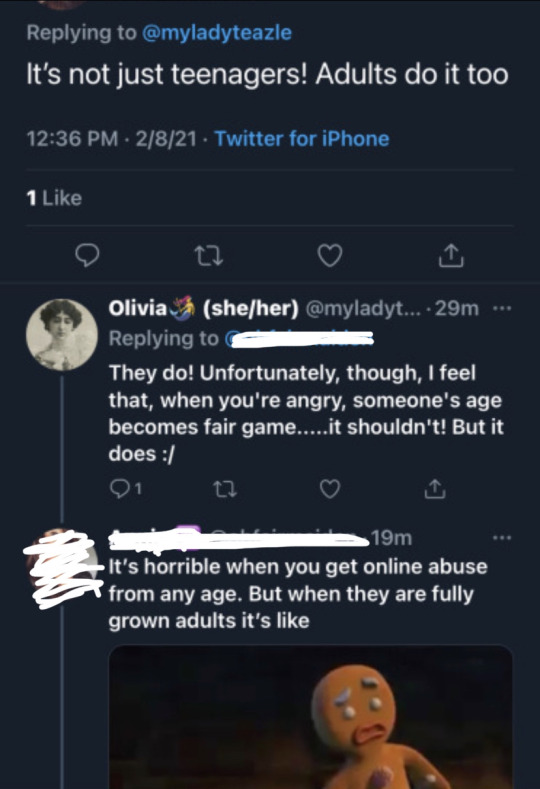
I agree. It’s disturbing that three grown women in their mid to late 20s have a vendetta against an 18 year old. Olivia acknowledged that her posts were reckless and that she would have acted differently if she just sat down and thought for one fucking second. But rather than correct the record on the same platform she made those accusations, she doubled down and took off to Twitter, saying that her anger entitled her to act that way. All with zero acknowledgement of the fact that the teenager SHE falsely accused and repeatedly mocked for her age was still being harassed by HER followers as a direct result of HER posts.
She might love the ‘clout’ that comes with a large following, but she evidently doesn’t care about the responsibility that comes with it. In Taylor and Haley’s case, it’s little more than a means to intimidate others into silence. Olivia might be a “respected history blogger” or a “good historian”, but that definitely doesn’t make her a good person. Far from it, if her behaviour is anything to go by.

This was on 9 February, 3 days after my first post. Bitching about me was all fun and games until the receipts came out, huh?
There’s nothing “insane” about keeping receipts, especially when Taylor and Haley are notorious for lying out of their arses and fake-apologising to people in the dm’s, only to continue mocking them on Twitter afterwards. You know what is insane though? Searching ‘romani’ on our blogs in a pathetic attempt to dig up dirt that doesn’t even exist (yeah, stat trackers exist). Do you know what else is insane? Haley spamming people with passive aggressive anons and sending anon hate to people who’ve already blocked her. She also “stalked” our WOTR group chat, though she’ll never admit to it, despite accidentally posting the dated receipts proving it. Oops!
It’s no secret that Taylor and Haley are cowards (as all bullies are), so it was no surprise when they eventually involved Olivia in their month-old vendetta against a teenager. They wanted to school a black girl on racism and Congolese genocide apologism, so they needed to get a “respectable history blogger” on their side. And Olivia happily obliged, kicking up such a fuss on their behalf that the teenager just offered to end it (despite the fact that Olivia vagued her first). Yet still Olivia continued, publicly mocking her age and calling her an “antisemite” long after the discussion was over (here she is on 24 February still carrying on). Either a teenager is old enough to be publicly shamed for being an “antisemite” and “antiromani bigot”, or she’s too young to be taken seriously. But at 25, Olivia is certainly old enough to know better than to participate in this kind of vile, petty, wannabe Mean Girl behaviour.
Olivia is not black. Taylor is not black. Haley is not black. So for the record, if you are not black, it is not your place to tell BLACK PEOPLE whether they can take issue with apologism for BLACK GENOCIDE. Multiple black history bloggers have already explained why they had a problem with Gareth Russell’s comments about the Congolese genocide (including the teen in question), yet that was less important to Olivia than not being able to call him a sexist weirdo because he’s gay. Olivia cannot speak on all minority issues — especially black and brown issues — and it is arrogant of her to assume that she can, especially since her understanding of the Gareth Russell issue came purely from “what she discussed with her two friends” by her own admission.

What a take. Here’s the “anti-Romani” post that I supposedly made. Precisely ZERO of my posts were about Olivia and not once did I even name her directly. So her claims that I mounted some kind of “vicious attack” against her is, uh, bullshit. Criticising her and her friends for their nasty, dishonest, and irresponsible behaviour isn’t “anti-Romani” just because she’s Romani. It’s no more “anti-Romani” than her erratic attempts to “expose” me are anti-Asian just because I’m Asian. It’s not any more “anti-Romani” just because the UK government has passed anti-Romani laws, any more than her telling deranged lies about me for over a month is an anti-Asian hate crime simply because there’s been an increase in anti-Asian hate crimes. I’m not British. I’m not from the UK. I have no control over whatever dumb, racist crap her government does. So she can fuck off and continue fucking off if she wants to make me personally responsible for that. The backlash she received had nothing to do with her identity and everything to do with how she purposely incited harassment against a teenager, defended her friends’ racism, and spread demonstrable lies to her followers. The “viciousness” of the backlash she received is directly proportionate to the viciousness of her own baseless attacks against others. She can claim to be more mature than an 18 year old all she wants, but do you know what the actual mature thing to do would have been? To not promote her friends’ lies and nonsense, especially when the other people they tried to involve had the sense to stay out of it.
Olivia, Taylor and Haley are fully-grown adults, but take no responsibility for their actions. Yet, they expect teenagers to have total control over not only their own emotions, but also the emotions and actions of others. Olivia thinks that a teen should be personally responsible for the behaviour of fully-grown adults, yet she’s close friends with Taylor — a racist, xenophobic bully who screenshots Tumblr people’s posts to mock them on Twitter (here and here from December), called Poles who’ve lost relatives in the Holocaust “genocidal loving freaks”, accused an openly Ashkenazi Jewish blogger of “internalised antisemitism” just for criticising her (a white gentile), said that people who like Mary I “resent their own siblings”, co-opted our struggles under Spanish imperialism just so she could bully ‘Spaniards’ (despite her being American and therefore equally responsible for genocide, by her flawed logic), and said that the black teen who called out her racism “really deserved to be bullied” and “needed to be policed”. Olivia is also close friends with Haley, who has a history of attacking people over posts that have nothing to do with her, publicly admitted to circumventing blocks in order to send hate anons, and likened me — a Filipino immigrant — to DONALD TRUMP and a neo-Nazi conspiracy theorist just because I posted the receipts exposing her lies, harassment of others, and projection.
Most of the people who have spoken out against these three didn’t even know each other until last month. Some of ‘us’ have actually blocked each other. Yet all of us agree that their behaviour towards others has been absolutely unacceptable. How is it that so many unrelated people from different corners of the ‘fandom’ have exactly the same problems with exactly the same people? If Olivia want us to take personal responsibility for “our friends’” behaviour, then she should first take responsibility for hers.

This is on 26 February, over a week after I last posted. As anyone with eyeballs can see, I called her British once. Not “repeatedly”. ONCE. So she can fuck off again with that bullshit. And why did I point that out? Because Olivia, a British citizen, made pejorative comments about “white Eastern Europeans!!!” just because she thinks some Polish people committed the heinous crime of... screenshotting her tweets. They didn’t even do it, and even if they did, how is that even relevant? Everyone knows that one specific Polish person lives rent free in Taylor’s head, so clearly Olivia just took Taylor’s word for it that it must have been The Poles who were “stalking” her. Maybe don’t take paranoid liars at face value next time?
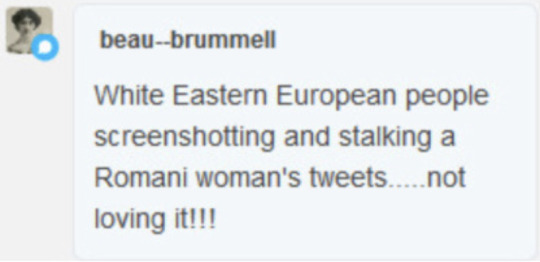
Shameless, ignorant, tone deaf nonsense. Olivia constantly demands that people treat her and her identity with the utmost respect, yet here she was on 9 February already disrespecting the identities of others just so she can score some petty ‘oppression points’ against them. Why even bring their nationalities up? And why call them “white Eastern Europeans” instead of Polish since she knows they’re Polish? Is it because acknowledging that they are Polish would mean acknowledging that she doesn’t actually have a monopoly on a claim to discrimination or Holocaust trauma? Could it be that dismissing them as just some “white Eastern Europeans” was just another way for her to add credence to her own “pathetic lies” about the situation? There’s a word for that behaviour, and it starts with pro- and ends with -jection.
Let me reiterate: it is IGNORANT of her to use their identity against them, especially when hate-crimes against Polish immigrants have increased in her home country, and especially when the specific people she insulted lost close relatives (including Jewish relatives) in the Holocaust. It’s not “repeatedly mocking her identity” to point out her hypocrisy. Her being Romani is not an excuse for casual xenophobia. She might be able to hide her identity in the UK (though she shouldn’t have to), but Polish immigrants do not have the privilege of passing as first-language white British. I cannot pass as non-Asian. The black girl she and her friends tried to bully off Tumblr cannot pass as non-black. Olivia weaponising people’s identity against them just because she thinks they saw her public tweets is ignorant, petty, and completely uncalled for. She should be absolutely ashamed for using that pathetic argument, but based on her most recent farrago of nonsense, she probably won’t be.
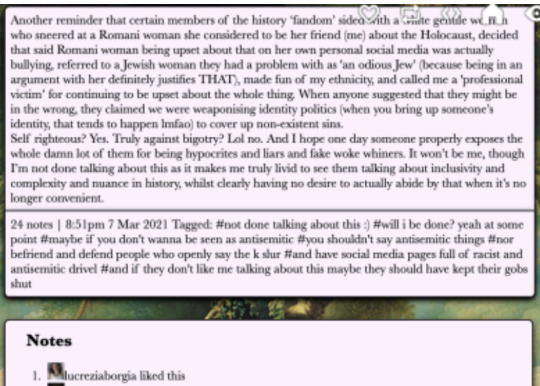
Here’s her on 7 MARCH. And of course Taylor was the first to like it lol. Olivia may have deluded herself into believing she was just an innocent bystander, but unfortunately, enough people saw her admitting to inserting herself into the situation at the behest of her two friends. With every post before and since, her accusations have gotten wilder and wilder, falser and falser, and more and more irrelevant because she knows full well that none of her followers will bother fact-checking her. That’s the beauty of vagueing people. It’s how Taylor and Haley have been able to get away with pulling the wool over peoples’ eyes for so long. Too bad repetition, projection, and self-righteous outrage doesn’t equate to the truth because those are all those three have.
“SOMEONE NEEDS TO EXPOSE THE WHOLE DAMN LOT OF THEM! BUT IT WON’T BE ME!”
No one has said anything since 18 February, yet here’s Olivia publicly inciting her followers again. She’s “done talking about it”, yet she’s the only one continuing the drama. She is being ‘persecuted’, yet she mobilises her followers to go after others. She needs to be defended against critics, yet she also can’t resist bragging about big her Tumblr following is, how “piddly” our notes are compared to hers, how she got over 30 followers to report my posts (they’re still up lol), and how many people she can get to dig through our blogs to find anything to “expose” us. Olivia, I’m sorry that you require constant validation from strangers on the internet, but not everyone has the same priorities as you. Some of us just come here to have fun, but having shitstarters in the community is decidedly un-fun.
All my posts were directed at Taylor and Haley, but since Olivia insists on making this revolve around her, let me clarify: she is a hypocrite and a professional victim. Words have meaning, and those words are the most accurate words to describe her behaviour. It has fuck all to do with her identity. She and Haley are professional victims because they act as if their minority statuses exempt them from basic rules of online courtesy and entitle them to run their mouths about others with no consequence. And Olivia is a hypocrite because she demands the respect and understanding that she has repeatedly refused to show to others. She made ignorant, xenophobic comments against Polish people because she falsely assumed they screenshot her public posts bitching about others. She pretends that the many POC who have spoken out against her are just some “white” hive-mind because admitting that we’re not white will discredit the victimhood narrative she’s been peddling to her followers. And she arrogantly presumes to be ‘our’ voice in the community, all while mobilising her following to intimidate and silence the minorities who take issue with her and her friends’ vile behaviour.
It’s extremely telling that in every one of her unlettered rants, Olivia made the conscious choice to conflate us with “white gentiles”, “white antisemites”, and “white Eastern Europeans”. Why? Because in order to “name and shame” us, she’d have to admit to her followers that the majority of the people criticising her aren’t actually “white”, but are in fact black, brown, and Jewish. Having repeatedly demanded that her followers defend her, her reputation and credibility now depends upon people continuing to see her as the oppressed victim of “bigoted whites”. Unfortunately for her and her friends, the truth will always come out. That’s what receipts are for, no matter what they claim.
The history community didn’t side with “a white gentile woman”. We sided with a black teenager who Olivia and her friends repeatedly mocked for her age, publicly and privately spread false accusations against, and incited their followers to harass with their never-ending posts. We sided against white racists like Taylor, and her white-passing enablers like Olivia and Haley. Since being called out for racism by a black girl discredited them, they had to discredit her. And unlike the others Taylor and Haley tried to involve, Olivia was their willing accomplice. If she has now been “alienated by half the history fandom”, it is because of her own behaviour and rightly so.
The ideal course of action would be for Olivia to finally take some responsibility for her actions, publicly apologise for her role in inflaming this drama, and move on like the rest of us have tried to do. But unfortunately, she may be too far gone in her own pathological need for online validation to ever admit wrongdoing without some serious introspection. So perhaps, Olivia, if anything else, you should just take your own advice and, once and for all, SHUT THE FUCK UP.
#here's my fucking rent#seeing as i've lived in your head for a whole month#dumb and dumber#disk horse for ts#long post
23 notes
·
View notes
Text
Fairy Tale Retellings with POC

@anjareedd asked:
Hello, Writing with Color! First of all, thank you for all you do. Second, do you have any advice for a white person retelling fairy tales, both European fairy tale and non-European fairy tales? Is it okay to retell non-European fairy tales? I would feel bad if all fairy tales I retold were European as those are over represented, but given how much white people have erased and whitewashed other culture's fairy tales I understand if that were off-limits for a white person. Thank you!
Fairy tale retellings are my favorite thing. I love reading, rewriting and creating new fairy tale-style stories with People of Color!
As you write, keep in mind:
European does not mean white.
The possibility of PoC in European or Western historical settings tends to throw off so many. There are plenty of European People of Color, then and today. You can have an Indian British little red riding hood and it isn’t “unrealistic.” And we wanna read about them!
Still, research the history of your settings and time period. Use multiple credible sources, as even the most well-known ones may exclude the history of People of Color or skim over it. The stories might be shoved into a corner, but we live and have lived everywhere. The specific groups (and numbers of) in a certain region may vary, though.
How and when did they or their family get there, and why?
Has it been centuries, decades, longer than one can remember?
Who are the indigenous people of the region? (Because hey, places like America and Australia would love to have you believe its earliest people were white...)
Is there a connection with the Moors, trade, political marriage; was it simply immigration?
No need to elaborate all too much. A sentence or more woven into the story in passing may do the trick to establish context, depending on your story and circumstance.
Or if you want to ignore all of that, because this is fantasy-London or whatever, by all means do. POC really don’t need a explanation to exist, but I simply like to briefly establish context for those who may struggle to “get it”, personally. This is a side effect of POC being seen as the Other and white as the default.
Although, if PoC existing in a fairy tale is the reader’s biggest stumbling block in a world of magic, speculation, or fantasy, that’s none of your concern.
Can you picture any of the people below, or someone with these backgrounds, the protagonist of their own fairytale? I hope so!
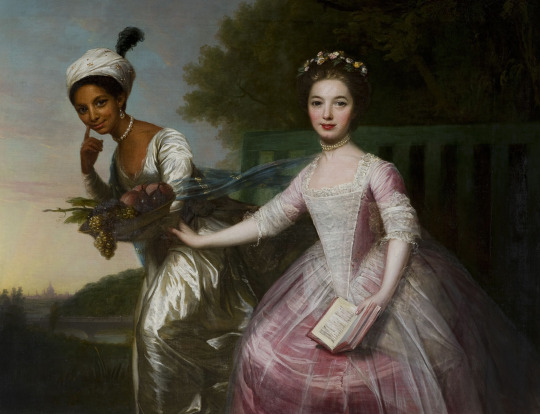
Above: Painting of Dido Elizabeth Belle (1760s - 1800s), British Heiress with her cousin. Check out her history as well as the movie, Belle (2013).
Source: English Heritage: Women in History - Dido Belle
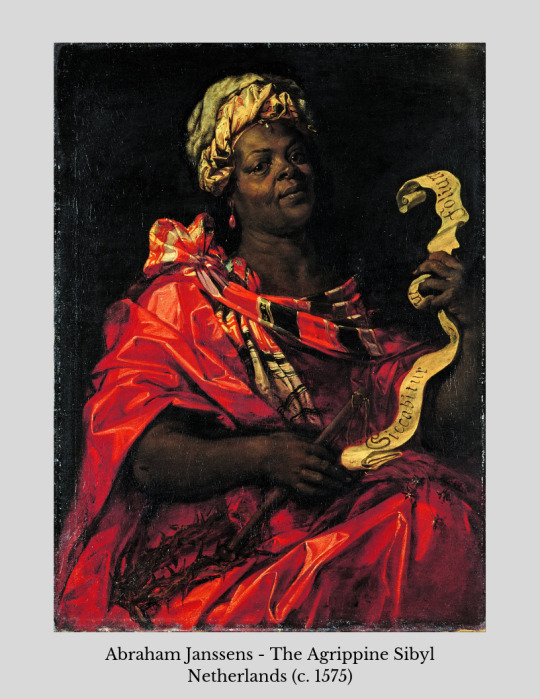
Above: Abraham Janssens - The Agrippine Sibyl - Netherlands (c. 1575)
“Since ancient times Sybils were considered seers sent by god, priestesses foretelling the coming of great events. This model serves to depict the Sybil of Agrippina, one of the 12 that foretold the coming of Christ. Notice the flagellum and crown of thrones which are symbolic objects reminding the viewer of Christs suffering.” X
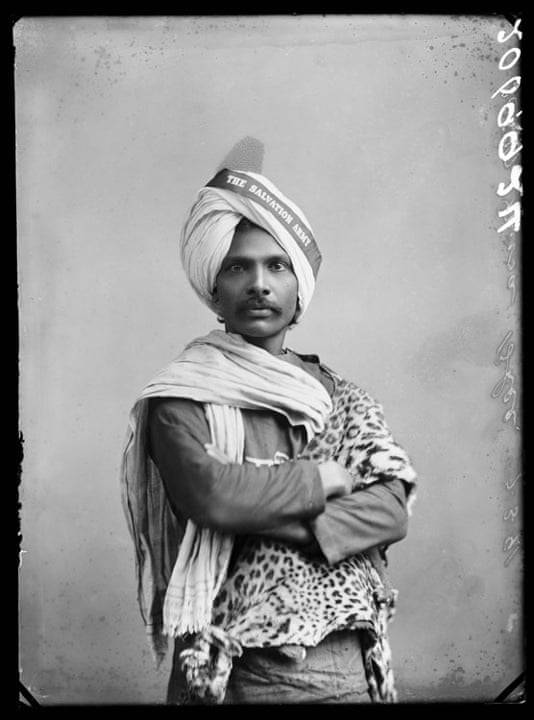
Above: “Major Musa Bhai, 3 November 1890. Musa Bhai travelled to England in 1888 as part of the Booth family, who founded the Salvation Army.” X
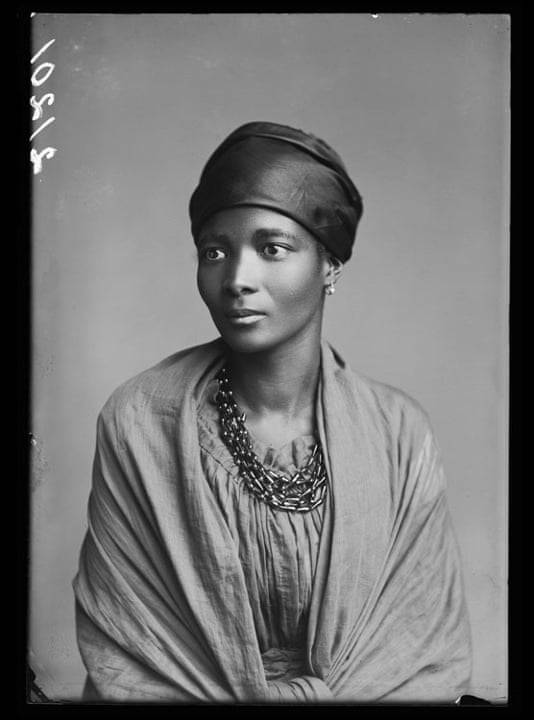
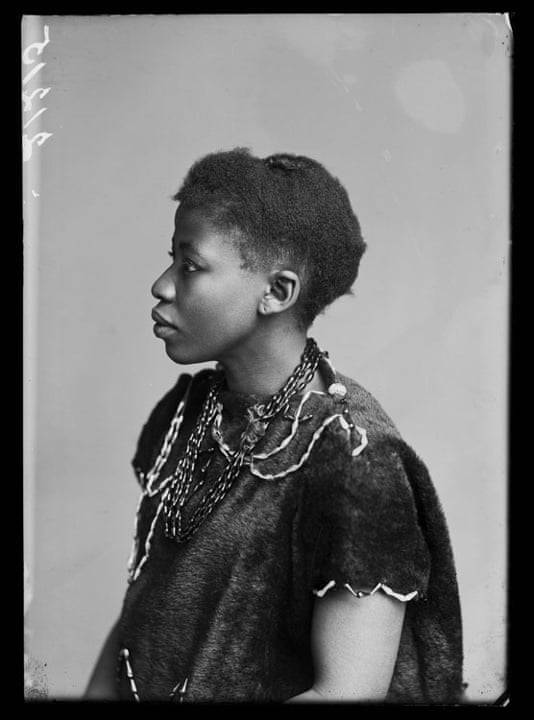
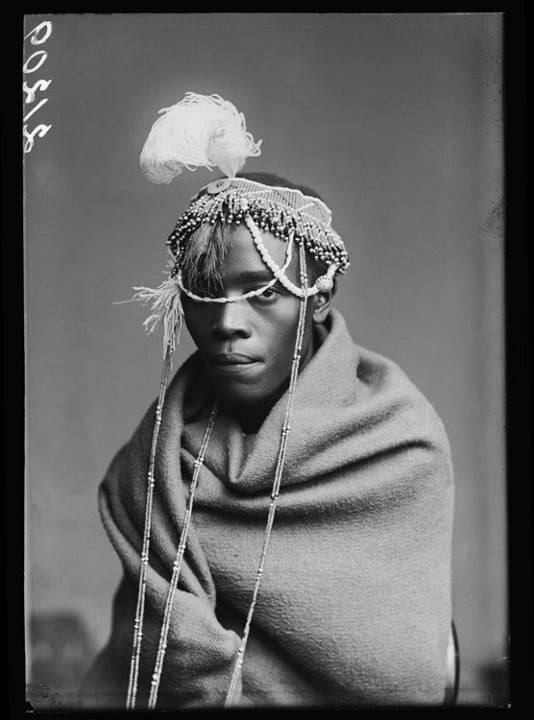
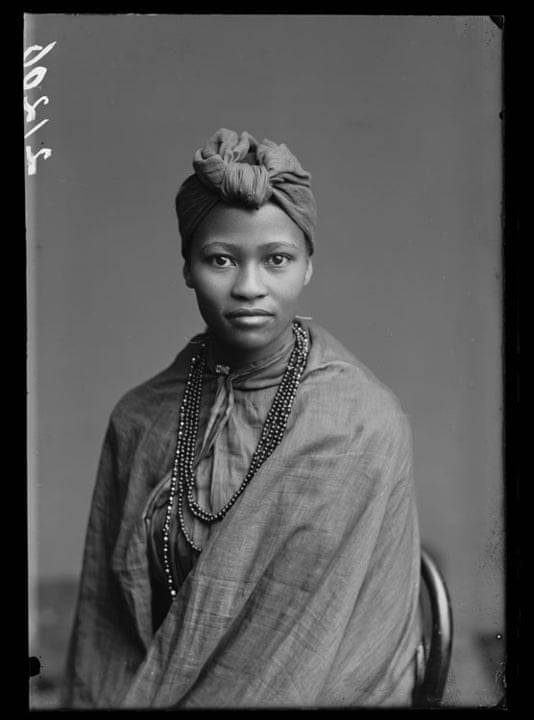
Above: Eleanor Xiniwe and Johanna Jonkers, respectively and other members of the African Choir, who all had portraits taken at the London Stereoscopic Company in 1891.
“The African Choir were a group of young South African singers that toured Britain between 1891 and 1893. They were formed to raise funds for a Christian school in their home country and performed for Queen Victoria at Osborne House, a royal residence on the Isle of Wight.” X
The examples above just scratch the surface. Luckily, more and more historians and researchers are publishing lesser known (and at times purposefully masked) PoC history.
More Sources
PoC in History (WWC Search Link)
POC in Europe (WWC Search Link)
The Black Victorians: astonishing portraits unseen for 120 years
Hidden histories: the first Black people photographed in Britain – in pictures
Let’s talk about oppression and slavery
There is a hyper-focus on chattel slavery as if the times when and where it occurred is the only narrative that exists. And even when it is part of a Person of Color’s history, that is seldom all there is to say of the person or their lives. For example, Dido Elizabeth Belle.
People of Color were not all slaves, actively enslaved, or oppressed for racial reasons at all times in history! Dig deep into the research of your time period and region. Across the long, wide history of the world, People of Color are and were a norm and also NOT simply exceptions. Explore all the possibilities to discover the little known and seldom told history. Use this as inspiration for your writing.
PoC (especially Black people) were not always in chains, especially in a world of your making.
Don’t get me wrong. These stories do have a place and not even painful histories should be erased. I personally read these stories as well, if and when written by someone who is from the background. Some might even combine fairy tale, fantasy, and oppression in history. However...
There are plenty of stories on oppressed PoC. How many fairy tales?
Many European tales have versions outside of Europe.
Just because a tale was popularized under a western setting doesn’t mean that it originates there. Overtime, many were rewritten and altered to fit European settings, values and themes.
Read original tales.
You might be inspired to include a story in its original setting. Even if you kept it in a western setting, why not consider a protagonist from the ethnicity of the story’s origin?
For example: the Cinderella most are familiar with was popularized by the French in 1697. However, Cinderella has Chinese and Greek versions that date back from the 9th Century CE and 6th Century BCE, respectively.
Choosing a Setting: European or Non-European?
I do not see anything wrong with either (I write tales set in western and non-western settings, all with Heroines of Color). There is great potential in both.
Non-Western Settings (pros and cons)
Normalizes non-Western settings. Not just the “exotic” realm of the Other.
Potential for rich, cultural elements and representation
Requires more research and thoughtfulness (the case for any setting one is unfamiliar with, though)
European or Western Setting (pros and cons)
Normalizes PoC as heroes, not the Other, or only fit to be side characters.
Representation for People of Color who live in Western countries/regions
Loss of some cultural elements (that character can still bring in that culture, though! Living in the West often means balancing 2+ cultures)
Outdated Color and Ethnic Symbolism
Many fairy tales paint blackness (and darkness, and the Other) as bad, ominous and ugly, and white as good and pure.
Language that worships whiteness as the symbol of beauty. For example: “Fair” being synonymous with beauty. Characters like Snow White being the “fairest” of them all.
Wicked witches with large hooked noses, often meant to be coded as ethnically Jewish people.
Don’t follow an old tale back into that same pit of dark and Other phobia. There’s many ways to change up and subvert the trope, even while still using it, if you wish. Heroines and heroes can have dark skin and large noses and still stand for good, innocence and beauty.
Read: Black and White Symbolism: Discussion and Alternatives
Non-European Fairy tales - Tips to keep in Mind:
Some stories and creatures belong to a belief system and is not just myth to alter. Before writing or changing details, read and seek the opinions of the group. You might change the whole meaning of something by tweaking details you didn’t realize were sacred and relevant.
Combine Tales Wisely:
Picking stories and beings from different cultural groups and placing them in one setting can come across as them belonging to the same group or place (Ex: A Japanese fairy tale with Chinese elements). This misrepresents and erases true origins. If you mix creatures or elements from tales, show how they all play together and try to include their origin, so it isn’t as if the elements were combined at random or without careful selection.
Balance is key:
When including creatures of myths, take care to balance your Human of Color vs. creatures ratio, as well as the nature of them both (good, evil, gray moral). EX: Creatures from Native American groups but no human Native characters from that same group (or all evil, gray, or too underdeveloped to know) is poor representation.
Moral Alignment:
Changing a good or neutral cultural creature into something evil may be considered disrespectful and misappropriation.
Have Fun!
No, seriously. Fairy tales, even those with the most somber of meanings, are meant to be intriguing little adventures. Don’t forget that as you write or get hung up on getting the “right message” out and so on. That’s what editing is for.
--Colette
#writing advice#representation#history#people of color#writing#fairy tales#fantasy creatures#supernatural beings#guides#long post#slavery#slavery mention tw#culture#images#asks
2K notes
·
View notes
Text
Lets get down to business.

^This is the checklist.^
I will reffer to it frequently.

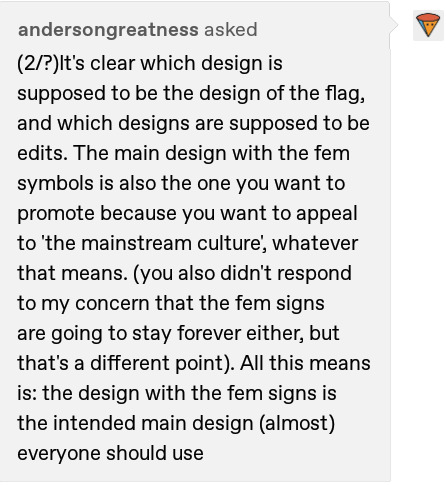

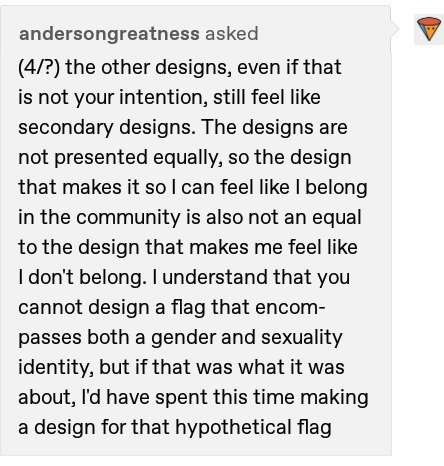
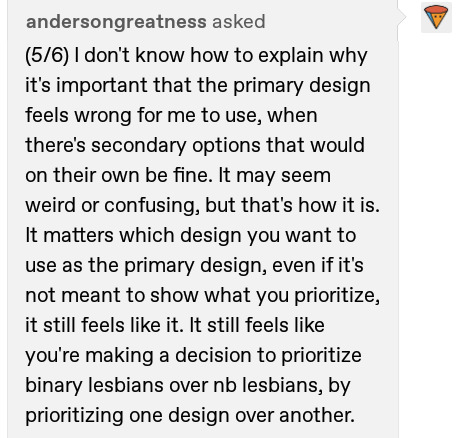

Ive understood you the past six times. I understand your frustration but you have to think of it from a broader perspective and understand that there are more variables at play than wheather or not nonbinary people feel like an afterthought.
Just so were on the same page I'm going to make a list of things and people (in no particular order, since tumblr likes to re arrange blocks of text anyway.) I have taken the time to consider and continue to have to think about with every edit.
Femmes
POC
Butches
Nonbinary Folk (anyone who doesn't identify as a male or female)
Composition
Color Theory
Merchandising
Replicability
Color Blindness
Epilepsy
Disabled folk
Trans Women
Mainstream Culture
Intersex people
Production cost
Traditional Symbolism
Ease of Understanding
Character icons
Fun edits
Honoring the Dead
Jewish people
Queer history
Making it hard to erase any identity certain people might try to exclude.
The DAD test
So keeping all these things and the checklist in mind lets run shit down and try to fix the flag.
Goal: make nonbinary people feel included.
So NB people don't identify with the fem signs.
That's valid I get that, I gave an all stripe flag for y'all to use as you wish.
But that still makes them an after thought.
You're right I kinda seems that way. How about we just get rid of the fem signs all together!
Here's all the problems getting rid of the fem signs all together:
1: it leaves quite the empty space and feels like a bad composition
2: violates checklist points 2 and 6.
3:the spotlight would be flat out unrecognisable
Well how so?
POC would be unhappy to know that they have been dropped from the flag. Id imagine the same kind of backlash from disabled lesbains aswell.
Why not just make them into stripes too?
1: we all know how much backlash the brown stripes get from white people who think they're ugly.
2: if nonbinary people are represented as a white stripe and disabled people were a white fem sign, what color stripe would we associated with disabled people?
3: too many stripes.
Alright so stripes aren't a great idea, why not change the fem signs into something a bit more nueteral? Like just circles.
1: looses the clever side of the design that has a couple walking down a road or atop a light house, who's sillouhets are the projection for the spotlight.
2: making them into say a circle is rather abstract and would not catch on.
3: would violate checklist points 2 and 4.
4: its just bad design.
Why not add a third sign?
That gets a bit too complicated and starts confusing the message.
So then how do we compromise in a way that is practical and appeals to a mainstream audience but isint racist/albeist?
Well you make the flag more versatile. Give it different forms for different people with different needs.
But why is the one with the fem signs introduced first and one for Enbies introduced second? Why not introduce them all at once? Why have a primary flag at all?
This is what's called boiling the frog.
If you introduce people to the new flag idea starting with 5 flags that can be used interchangeably, they're going to be rather overwhelmed and might find themselves angry at such a preposterous idea.
So what you do is you introduce the flag with the most signage as the "main flag" and for every flag that is a subtraction of signage, introduce it as a resource for editing.
This allows people to use whatever form of the flag makes them most comfortable without making anyone else feel as if though they've been excluded from representation entirely. It also gives the opprotounity to explain to the clueless why you're using the "resource for edits" as the flag. It gives you a chance to explain to the curious the nuances to your identity at a pace that the person questioning would not be overwhelmed by, and might actually have a shot at understanding.
To say one is an after thought when 1.0 also had nonbinary people is truely reading a tad bit too into it and s little foolish considering you've been woven into the fabric of the flag since the very beginning.
Wait, why do we have to appeal to mainstream culture at all? Queer people have never been mainstream?
I think Natalie Wynn (contrapoints) said it best:
"If you want to persuade someone it helps to meet them where they're at"
So what does that mean?
Well it means baby steps. If we wish to educate people on the variety of lesbians we first have to appeal to what they think a lesbian is. Then over time you can slowly slip your more woke and educated points in.
Most people (outside of tumblr) dont know what a nonbinary person is, much less what the signage for them would look like.
But even that is not what lesbians as a whole are mostly concerned about as for us, where people are currently at is still not knowing what fucking flag to use for lesbians. The fem signs give a very difinitve answer to the question "wait what's that new flag suppose to be?" and potentially sparks interest into finding out why a post used this flag instead of the lipstick lesbian flag.
While it's not the wokest flag around it has been made very strategically to make replacing the old flag, easier and make more sence to the clueless onlooker.
Now a little bit about how graphic design and symbols work:
Lets talk about bathrooms for second. More specifically gendered public bathrooms. I know this is a hot topic and a lot of people are on board with having gender neutral bathrooms.
So for the sake of this example working lets get more specific and say were talking about porta potties. Technically all porta potties are gender neuteral, BUT for camping events lasting longer than a few days on grounds with no plumbing they have a womens porta potty.
Womens porta potties are exactly the same as all the others. They even have a urinal pipe for men. The reason that there is a womens porta potty is because some women do occasionally go on their periods and hazardous waste with blood in it has to be treated differently than hazardous waste without.
Now there's alot of different women and not all of them wear dresses. But the sign on the door to the womens portable shitter has a little picture of a person in a dress.
They dont use that signage to alienate people or dictate what women can wear. It simply uses the culture to illustrate what this crapper is.
They could put a biohazard sign on the women's toilet but, all fecal matter is a biohazard, blood or no blood.
Since not everyone is super savvy on what the bio hazard sign would imply about a women's camping toilet, that would be considered hostile design. Its not easy to understand.
Hostile design as a term usually applied to doors, or anti homless spikes but can be applied more broadly.
Now using the fem signs on the lesbian flag is the same as using the little dress person on a bathroom. Its not making a statement about the demographic using the item, it simply serves to make as obviously as possible using the cultural landscape it lives in, what the thing is for/about.
The most common signage used for lesbians is the interlocking fem signs. Using it on a thing simply states that thing that it is printed on is for or about lesbians.
Without the signs, it may be hard to figure out what flag its suppose to be if nobody told you.
Your frustration is valid and I'm not trying to make you an afterthought. Ive put alot more thought, time and, effort into this than I think anyone realizes.
If enough nonbinary people say they really wont use or support the flag I will make a new one, but be warned: I will throw a fit.
I will whine about it not only because I'm a little bitch like that, but also because its actually a fucking challenge that will require starting over from scratch.
But don't get me wrong I am still absolutely HELLBENT on making a flag that works.
12 notes
·
View notes
Text
The Problem of "Centering" and the Jews
Note: I wrote this piece quite a few months ago, shopping around to the usual Jewish media outlets. None were interested, and I ended up letting it slide. But it popped back into my mind -- this Sophie Ellman-Golan article helped -- and so I decided to post it here. While I have updated it, some of the references are a bit dated (at least on an internet time scale). Nonetheless, I continue to think a critical look at how the idea of "centering" interacts with and can easily instantiate antisemitic tropes is deeply important.
* * *
In the early 2000s, Rosa Pegueros, a Salvadoran Jew, was a member of the listserv for contributors to the book This Bridge We Call Home, sequel to the tremendously influential volume This Bridge Called My Back. Another member of the listserv had written to the group with "an almost apologetic post mentioning that she is Jewish, implying that some of the members might not be comfortable with her presence for that reason." She had guessed she was the only Jewish contributor to the volume, so Pegueros wrote back, identifying herself as a Jew as a well and recounting a recent experience she perceived as antisemitic.
Almost immediately, Peugeros wrote, another third contributor jumped into the conversation. "I can no longer sit back," she wrote, "and watch this list turn into another place where Jewishness is reduced to a site of oppression and victimization, rather than a complex site of both oppression and privilege—particularly in relationship to POC."
Pegueros was stunned. At the time of this reply, there had been a grand total of two messages referencing Jewishness on the entire listserv. And yet, it seemed, that was too much -- it symbolized yet "another place" where discourse about oppression had become "a forum for Jews."
This story has always stuck with me. And I thought of it when reading Jews for Racial and Economic Justice's guidebook to understanding antisemitism from a left-wing perspective. Among their final pieces of advice for Jews participating in anti-racism groups was to make antisemitism and Jewish issues "central, but not centered".
It's good advice. Jewish issues are an important and indispensable part of anti-racist work. That said, we are not alone, and it is important to recognize that in many circumstances our discrete problems ought not to take center stage. That doesn't mean they shouldn't be heard. It just means they should not be given disproportionate attention such that they prevent other important questions and campaigns from proceeding. Ideally, "central, but not centered" in the anti-racism community means that Jewish issues should neither overwhelm the conversation nor be shunted aside and ignored outright.
Yet it also overlooks an important caveat. Too often, any discussion of Jewish issues is enough to be considered "centering" it. There is virtually no gap between spaces where Jews are silenced and spaces where Jews are accused of "centering". And so the reasonable request not to "center" Jewish issues easily can, and often does, become yet another tool enforcing Jewish silence.
Pegueros' account is one striking example. I'll give another: several years ago, I was invited to a Jewish-run feminist blog to host a series of posts on antisemitism. Midway through the series, the blog's editors were challenged on the grounds that it was taking oxygen away from more pressing matters of racism. At the time, the blog had more posts on "racism" than "antisemitism" by an 8:1 margin (and, in my experience, that is uncommonly attentive to antisemitism on a feminist site -- Feministing, for example, has a grand total of two posts with the "anti-Semitism" tag in its entire history). No matter: the fact that Jewish feminists on a Jewish blog were discussing Jewish issues at all was viewed as excessive and self-centered.
Or consider Raphael Magarik's reply to Yishai Schwartz's essay contending that Cornel West has "a Jewish problem".
Schwartz's column takes issue with West's decision to situate his critique of fellow Black intellectual Ta-Nehisi Coates by reference to "the neoliberal establishment that rewards silences on issues such as Wall Street greed or Israeli occupation of Palestinian lands and people." Magarik's reply accuses Schwartz of making the West/Coates dispute fundamentally "about the Jews", exhibiting the "the moral narcissism in thinking that everything is about you, in reading arguments between Black intellectuals about the future of the American left and asking: How can I make this about the Jews?"
Now, Magarik is surely correct that the Jewish angle of West's critique of Coates is a rather small element that should not become the "center of attention" and thereby obscure "the focus [on] Black struggles for liberation." But there is something quite baffling about his suggestion that a single column that was a drop in the bucket of commentary produced in the wake of the West/Coates exchange could suffice to make it the "center of attention". If Magarik believes Schwartz overreacted to some stray mentions of Jewish issues in an otherwise intramural African-American dispute, surely Magarik equally brought a howitzer to a knife fight by claiming that one article in Ha'aretz single-handedly recentered the conversation about the West/Coates feud onto the Jews.
What's going on here? How is it that the "centering" label -- certainly a valid concern in concept -- seems to routinely and pervasively attach itself to Jews at even the slightest intervention in policy debates?
The answer, as you might have guessed, relates to antisemitism.
As a social phenomenon, antisemitism is very frequently the trafficking in tropes about Jewish hyperpower, the sense that we either have or are on the cusp of taking over anything and everything. Frantz Fanon described antisemitism as follows: "Jews are feared because of their potential to appropriate. ‘They’ are everywhere. The banks, the stock exchanges, and the government are infested with them. They control everything. Soon the country will belong to them.” If we have an abstract understanding of Jews as omnipotent and omnipresent, no wonder that specific instances of Jewish social participation -- no matter how narrow the contribution might be -- are understood as a complete and total colonization of the space. What are the Jews, other than those who are already "everywhere"?
Sadly, the JFREJ pamphlet does not address this issue at all. When "central" crosses into "centering" will often be a matter of judgment, but while the JFREJ has much to say about Jews making "demands for attention" or paying heed to "how much oxygen they can suck out of the room", it does not grapple with how the structure of antisemitism mentalities often renders simply being Jewish (without a concurrent vow of monastic silence) enough to trigger these complaints. It doesn't seem to realize how this entire line of discourse itself can be and often is deeply interlaced with antisemitism.
JFREJ's omission is particularly unfortunate since Jews have begun to internalize this sensibility. It's not that Jewish issues should predominate, or always be at the center of every conversation. It's the nagging sense that any discussion of Jewish issues -- no matter how it is prefaced, cabined, or hedged -- is an act of "centering", of taking over, of making it "about us." When the baseline of what counts as "centering" is so low, I know from personal experience that even the simplest asks for inclusion are agonizing.
As early as 1982, the radical lesbian feminist Irene Klepfisz identified this propensity as a core part of both internalized and externalized antisemitism. She instructed activists -- Jewish and non-Jewish alike -- to ask themselves a series of questions, including whether they feel that dealing with antisemitism "drain[s] the movement of precious energy", whether they believe antisemitism "has been discussed too much already," and whether Jews "draw too much attention to themselves."
Contemporary activists, including many Jews, could do worse than asking Klepfisz's questions. For example, when Jews and non-Jews in the queer community rallied against the effort by some activists to expel Jewish and Israeli LGBTQ organizations from LGBT conference "Creating Change", Mordechai Levovitz fretted that they had "promoted the much more nefarious anti-Semitic trope that Jews wield disproportionate power to get what we want." Levovitz didn't support the expulsion campaign. Still, he fretted that even the most basic demand of inclusion -- don't kick queer Jews out of the room -- was potentially flexing too much Jewish muscle. In this way, the distinction between "central" and "centering" collapses -- indeed, even the most tertiary questions are "centering" if Jews are the ones asking them.
This is bad enough in a world where, we are told, oppressions are inextricably connected (you can tell whose perspective is and isn't valued in these communities based on whose attempts to speak are taken to be remedying an oversight and whose are viewed as self-centered derailing). But it verges on Kafka-esque when persons demand Jews "show up" and then get mad that they have a voice in the room; or proactively decide to put Jewish issues on their agenda and yet still demand Jews keep silent about them.
Magarik says, for example, that Jews "were not the story" when the Movement for Black Lives included in its platform an accusation that Israel was creating genocide; we shouldn't have made it "about us". He's right, in the sense that this language should not have caused Jews to withdraw from the fight against police violence against communities of color. He's wrong in suggesting that Jews therefore needed to stop "wringing our hands" about how issues that cut deep to the core of our existence as a people were treated in the document. Jews didn't demand that the Movement for Black Lives talk about Jews, but once they elected to do so Jews were not obliged to choose between the right's silence of shunning and the left's silence of acquiescence. To say that Jews ought not "center" ourselves is not to say that there is no place for critical commentary at all. We are legitimate contributors to the discourse over our own lives.
I'm not particularly interested in the substantive debate regarding whether Cornel West has a "Jewish problem" -- though Magarik's defense of West (that he "has a good reason for focusing on Palestine" because it "demarcates the difference between liberalism and radicalism") seems like it is worthy of some remark (of all the differences between liberals and "radicals", this is the issue that is the line of demarcation? And that doesn't exhibit some sign of centrality that Jews might have valid grounds to comment on, not the least of which could be wondering how it is a small country half a globe away came to occupy such pride of place?). The larger issue is the metadebate about whether it's valid to even ask the question; or more accurately, whether it is possible -- in any context, with any amount of disclaimers about relative prioritization -- to ask the question without it being read as "centering". The cleverest part of the whole play, after all, is that the very act of challenging this deliberative structure whereby any and all Jewish contributions suffice to center is that the challenge itself easily can become proof of our centrality.
But clever as it is, it can't and shouldn't be a satisfactory retort. There needs to be a lot more introspection about whether and how supposed allies of the Jews are willing to acknowledge the possibility that their instincts about when Jews are "centered" and when we're silenced are out-of-whack, without it becoming yet another basis of resentment for how we're making it all about us. And if we can't do that, then there is an antisemitism problem that really does need to be addressed. When discussing their struggles, members of other marginalized communities need not talk about Jews all the time, or most of the time, or even all that frequently. But what cannot stand is a claimed right to talk about Jews without having to talk with Jews. The idea that even the exploration of potential bias or prejudice lurking within our political movements represents a deliberative party foul is flatly incompatible with everything the left claims to believe about how to talk about matters of oppression.
West decided to bring up the Jewish state in his Jeremiad against Coates. It was not a central part of his argument, and so it should not be a central part of the ensuing public discussion. But having put it on the table, it cannot be the case that Jews are forbidden entirely from offering critical commentary.
One might say that a column or two in a few Jewish-oriented newspapers, lying at the tertiary edges of the overall debate, is precisely the right amount of attention that should have been given. If that's viewed as too much, then maybe the right question isn't about whether Jews are "centering" the discussion, but rather whether our presence really is a "central" part of anti-racism movements at all.
Drawing the line between "central" and "centering" is difficult, and requires work. There are situations where Jews demand too much attention, and there are times we are too self-effacing. But surely it takes more than a single solitary column to move from the latter to the former. More broadly, we're not going to get an accurate picture of how to mediate between "central" and "centering" unless we're willing to discuss how ingrained patterns of antisemitism condition our evaluations of Jewish political participation across the board.
via The Debate Link https://ift.tt/2MjQd84
303 notes
·
View notes
Text
Thoughts on Why V for Vendetta is Popular among Neo-Nazi’s
Did you guys know that before all this certain stories were like my special interest. Like I would hyperfixate on them and explore each theme inside and out and talk about them until people were tired of listening. Thank you to those who listen anyways.
I wrote tons and tons of personal meta but never really posted much. I never thought my words amounted to much. I never thought anybody would be interested.
For some of you that’s true, and some of that was self-loathing and I’m trying to radically accept that by considering that some of you do care about me and might be interested, even though like V, I am verbose, and intense, and chaotic. And I might scare you and maybe I am both hero and monster personified. That I’m impatient and angry and bloodthirsty and love fiercly but quietly and anonymously so Nazi’s can’t use my love against me. Like how sick are Nazi’s, right? (Also thinking of one of my few white boy loves, Anders. *waves* I might talk about you too, babe, just wait.)
Where is my morality now? I know at best I’m a grey. Chaotic good? Chaotic Neutral? Maybe I flit between the two like V does. Cause I don’t know if the decisions I’m making are the right ones. I just know that decisions need to be made. And I can’t waste much time on people that can’t remind me that we are sharing this struggle. Cause I need to remind myself every moment that the world is so incredibly beautiful and it’s made of sacrifices of love. And I see the potential, and my life, connecting your life, connecting to everything that has come and will come before me. And at so much of the time it overwhelms me. That how those potentials and dreams are dying before my eyes. And when the dream dies, follow the bodies. And that is worth becoming a monster for. I think of those that I still haven’t unfollowed. I wonder how I put you in danger. But the information you can give is worth putting you in danger for. And it disgusts me about myself. But I have to make it.
Many of you are like Evey, lost and scared. I feel like I’ve been marching to my death with every breath I take, with every calculated action. Will saying this in this way have the impact I need it to have? Will it have the motion I need it to have? Sometimes I have to accept though I can try to carefully craft my message and implore you to rise before I need to consider such drastic actions you will only see my mania and not my humanity. This movie makes me feel like manic disabled people are always the first to die for causes like this. Because we love to ofiercly and violently around people that this is the only way you can show it, is through self-sacrifice. (Yay BPD) And I hope that it was enough to erase the evil that i know is inside me. I don’t want to see that potential in me. It scares me. It disgusts me. It makes me feel inhuman. But who else is going to make that choice? If I don’t, someone else makes that choice. And I can’t live with that. Maybe it takes the traumatized to protect others from trauma. I feel like it’s my job.
But I remember I do it out of love. And love can be a force for good or evil. And sometimes it’s hard for me to tell which side I’m on. But I have to just make the decisions and let others decide if my actions are good or evil. And let it stand because I have to own my actions if I expect others to. It’s kind of why it’s hard for me to let go of Obama as a personal hero. I see the odds and I wonder how many deaths he prevented by letting others die. I wonder.
I feel like I hadn’t truly internalized V’s attitude of resistance in every breath to inspire resistance in my neighbor. I feel like the mistake was to not make it clear that V was a person of color. That V was from a marginilized demographic and religion where resistance is in the blood. Where it is whispered to children growing up, while trying to let them have their childhoods.
If I told white people my beliefs they would scoff at me and tell me of my imagination. You would use my posts as reference to that imagination. I am aware. I am ahead of you. Not as far as V, because Gods I wish I had a timeline. A goal set for this to end.
We march slow because open war kills more people. We can be mad but it’s true. I tell myself, V had a plan. Stick to it. Remember your goals. Whoever falls. No matter how you feel. But I do remember to let myself cry. And scream. And throw things. And be angry that though this is my decision, white people made me make it. But don’t get me wrong. I am ready to march to my death. I am ready to be your wake up call. So please hear me when you can so my spirit of resistance stays with you.
I was ashamed to love V for Vendetta because of terrible white fascist fandom. I couldn’t explore the implications of change just by destroying money and symbols and not people without white people calling me a terrorist.
So Neo Nazi’s got a hold of it.
And they twisted the message so you couldn’t hear it.
If it’s in your ability I challenge you to rewatch it and try to internalize the spirit of resistance. For white people this will be easier for you to identify with because the faces are pale but I think Natalie Portman is Jewish? So we do have that. POC and all other intersections really don’t need to retraumatize themselves by revisiting what we’re going through. It was empowering for me but maybe what you need is Spongebob or whatever your show is.
Maybe send me some movie, book, comic recommendations. Hard to practice self care right now but these stories help give me catharsis so keep my head isclearer, cause I can’t make mistakes.
#fascism watch#v for vendetta#militant resistance#nazi resistance#Also remember the power of anonymity. Remember the power of your voice and your action and even your death. I'm not asking you to make it#but if all your neighbors are making it take that risk with them#the more of you willing to take the risk the safer you all will be#because fascism picks you off and divides you#so take whatever symbols you need to unite with
0 notes
Text
On Being in the Room
MaNishtana, a prominent African-American Jewish writer, has a bracing but well-worth-it post on the (generally White) Jewish reaction to a racial justice march being scheduled for Yom Kippur. In some ways, I consider it to be part of the same conversation I was having in my "On Asking Jews To Be More Anti-Nazi" post, although the march here -- being focused on police violence -- is more specified than that.
MaNishtana makes several points, but the core observation is simple: Decisions are made by the people in the room. If even one reasonably-observant Jew or Jewish organization had been involved in the march's organization, they could have pointed out the conflict in advance -- prior to the public announcement of its date. What does it say about us that none of us were in that room? How does that comport with our supposedly fervent desire to be included?
This also relates to the Jewish complaints about Black Lives Matter (really, the Movement for Black Lives platform -- the fact that many of the critics don't know the difference again belies at least some of the sound and the fury). If it seems like they take a hostile stance towards matters important to Jews, can't that be explained at least in part based on who is showing up? This was Jonathan Zasloff's point and one I concurred with in my own assessment of the MBL platform language -- it was, in part, a case of being out-hustled. When Jews aren't present, people who don't really know or care about Jews (or worse, those actively hostile to Jews) get to set the agenda. That those groups beat us to the punch in terms of getting a critical mass of influence inside these emergent grassroots organizations is not something to be proud of.
I also think MaNishtana makes a critical point about the overreliance of White Jews on the legacies of 60s, and particularly Andrew Goodman and Mickey Schwerner. As he observes, this is starting to border on "Party of Lincoln" territory: "If your most significant proof of social engagement and moral uprightness is an event from *three* generations ago, then that is a problem, and you need to figure out why." I agree that it is time to retire the 1960s as proof of Jewish "showing up" for racial justice. It's time for us to make our own history.
So all of that is an endorsement of a necessary critique. Yet, in keeping with my other post, I still think it's important to provide the counterweight. In any conversation about who isn't "in the room", there are explanations that suggest the absent group doesn't really wish to be there, and there are explanations that focus on ways they might be deterred from showing up. In feminist history, there were many instances of predominantly white women's groups "unintentionally" marginalizing women of color, in ways that almost certainly never would have happened if women of color were "in the room" in any significant numbers. And some of the white women would then wonder why they weren't in the room -- didn't they know they were welcome? Didn't they know they were desired? This was taken as axiomatic; it wasn't even considered that there might be reasons why they weren't in the room and that they might not actually feel welcomed or desired.
It is true that many mainstream Jewish organizations simply were flat-footed in getting involved in movements like Black Lives Matter, and their absence is what let groups and persons with a more hostile tone towards Jewish concerns take the lead. Some of that is an issue of medium: Compared to the 1960s, Jewish political organizing has shifted significantly in an institutional direction -- large organizations which seek to connect with and influence other large institutional players through means like lobbying, amicus briefs, political donations, and so on (think AIPAC, ADL, AJC, and so on). These groups actually have solid connections with the institutional elements of the Black community (e.g., the NAACP, or the Congressional Black Caucus) -- one of the reasons why I think the supposed Black/Jewish crack-up is widely exaggerated -- but they are not well-geared towards handling incipient grassroots activism that for the most part did not proceed through these channels. Beyond whatever ideological differences they might have from more institutional Jewish groups, one reason groups like IfNotNow are gaining momentum is that they have the agility to be part of this style of grassroots, street-level activism, in a way that the hulking behemoths of the Jewish community simply cannot match.
All that said, there absolutely were Jews who really did "show up early" for these causes -- and, importantly, there were non-trivial efforts to push out them out of the room. The case of St. Louis Rabbi Susan Talve is a clear instance of that. The Jews kicked out of the Chicago Dyke March were showing and had been for years. Ditto those at Creating Change -- by definition, they were showing up. Or consider the headline Stacey Aviva Flint got hit with in the Atlanta Black Star when she expressed her ambivalence towards the MBL platform due to its Israel language: "Black Jews Stood with ‘BLM’ Until It Questioned U.S.’ Unrelenting Support to Israel." It's not a universal by any means; indeed, as I noted in my last post there is a strong and significant tradition of African-Americans in particular rejecting efforts to leverage their political organizing as a fulcrum to marginalize or exclude Jews. Certainly, the narrative that African-Americans are especially bad on this issue is simply unsustainable. But in left spaces such exclusion happens often enough such that many Jews will be hesitant to jump into the unknown -- a hesitation that cannot be reduced down to simple white fragility.
All of this flows naturally from the same suppositions as above: decisions are made by the people in the room. The same logic that says Jews should be in the room if they want the decisions to reflect Jewish concerns also tells us that people who want to subordinate Jewish concerns should try to push Jews out of the room. And the logic of racial capitalism, in turn, explains why dissident Jewish factions (in these contexts, generally anti-Zionist Jews -- though in other spaces right-wing Jews occupy a similar role) are often the prime movers perpetuating this exclusion: excluding other Jews enhances the power of the remaining Jews in circumstances where it is symbolically important to have a Jewish presence (as "diversity", or as a bulwark against charges of antisemitism). Put another way: JVP tried to push out Rabbi Talve because a BLM campaign where people like Rabbi Talve are present and active is one where JVP has less influence on BLM than a BLM campaign where people like Rabbi Ralve are excluded. It is a rational political strategy.
So we shouldn't be surprised that there will be barriers to mainstream Jewish participation in these movements -- plenty of people have an incentive to throw those barriers up. This doesn't mean that such barriers are the whole story anymore than it means Jewish apathy to racial justice is the whole story. As I said, I'm presenting a counterweight, not a counterargument.
There's one further thought that sprang to mind on this. There is a tension between the logic of the "if you want to influence the decisions you have to be in the room" argument" and the normative request that Jews or other Whites ought not "police" POC-led initiatives. MaNishtana's critique posits that Jews should have had enough presence and power within the organization setting up a march for racial justice such that they could ensure that the date didn't fall on Yom Kippur. Fair enough. But surely we all know that there are other critiques of (particularly, but not exclusively White) Jewish standing in such spaces that focus precisely on our alleged propensity to take over the spaces -- to arrogate decision-making power to themselves in a way that impeded Black self-determination of their own struggle. This controversy was what lay behind the decision by SNCC to forbid Whites from holding leadership positions in the organizations (which led to the expulsion of several Jewish leaders). Years later, in the early 1980s, it led to a boycott of the class Jack Greenberg was co-teaching with Julius Chambers on race and the law at Harvard Law School. Greenberg had helped argue Brown v. Board, succeeded Thurgood Marshall as chief lawyer for the NAACP, and was founding member of MALDEF. He was certainly someone who had absolutely been "in the room"; whatever else the controversy might have been about it, it couldn't be about that. That said, Black students were not wrong to be concerned that Harvard's record of hiring Black professors was appalling, and that there was something especially grating about the implied suggestion that even in the field of race the only option was for the class to be (co-)taught by a White guy.
I don't want to simplify these stories -- I think they are complex, and I think often they were more a case of Jews being caught in the cross-fire of a valid impulse towards self-determination than any conscious desire for antisemitic exclusion. At the same time, I think Jews are particularly vulnerable to this sort of "critique" due to antisemitic tropes wherein the Jews is portrayed as all-powerful, all-controlling, conspiratorial, pulling the strings, taking over the movement, and so on. The result is a catch-22 where, too often, there is virtually no gap between "why aren't Jews showing up" and "why are Jews dominating the space?"
Any non-trivial Jewish presence and participation -- particularly when it takes a critical form -- will quickly be recoded in this way. Rosa Maria Pegueros recounts her experience on a email list for contributors to This Bridge We Call Home where two -- two -- messages mentioning Jewishness were enough to elicit complaints that the listserv was turning into (in Pegueros' words) "a forum for Jews." I can relate (the complaint discussed in that post about "excessive" focus on Jewish issues was triggered by my own stint guest-blogging at Alas, a Blog. Barry Deutsch, the owner of the site, observed that even with my contributions the number of posts tagged "racism" outnumbered those tagged "antisemitism" by more than an 8:1 margin). Reacting to the Creating Change fiasco, one Jewish commenter lamented the exclusionary impulse which tried to kick out Jewish and Israeli LGBTQ organizations, but was more concerned that the Jewish community was publicly and effectively organizing to resist it, sympathetically describing the sentiment of conference attendees "that external Jewish power was dictating conference policies." (What they were "dictating" was that an LGBTQ conference shouldn't arbitrarily and at the last minute exclude either Israeli LGBTQ organizations or the North American Jewish LGBTQ groups who partner with them).
Like with the last post then, my ending line is meant to be ambivalent. There absolutely is a propensity within the Jewish community to rest on the glory days of the 1960s as an excuse for why we need not do the hard work of jumping back into the racial justice fray today. That needs to stop, and while different people participate in the cause in different ways, simply venerating dead Jews who marched with King is not actually a form of participation. Yet a full look at why -- to the extent it is so -- Jews are hesitant to fully link up with contemporary social justice organizing has to critically engage with the full structure of antisemitic exclusion, an inquiry which necessitates a deep dive into how antisemitism and Jewish marginalization manifest historically and contemporaneously. It can, after all, be simultaneously true that some Jews don't want to participate in contemporary racial justice causes in any way beyond the perfunctory, and that others really are trying to "show up" but face genuine barriers, both prejudicial and structural. And on the situation of White Jews particularly, I firmly believe that an intersectional analysis that seriously looks into what Whiteness and Jewishness do to one another is the only way to get a clear handle on the actual circumstances being faced here.
via The Debate Link http://ift.tt/2v824ul
39 notes
·
View notes